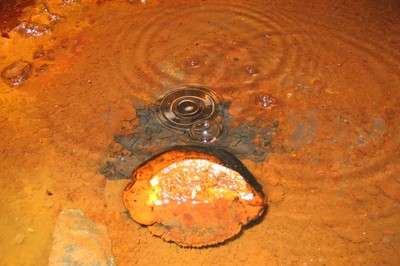December 16, 2016 report
New record for oldest water found in Canada

(Phys.org)—A team of researchers working deep in a mine in Canada has found water samples that date back approximately 2 billion years, breaking the record of oldest discovered water on the surface of the Earth by approximately 500 million years. The group presented their findings at the American Geophysical Union Fall Meeting last week in San Francisco.
Scientists have known for some time that water exists far below the ground—water that has been isolated from what is normally known as the water table—unseen and untouched for billions of years. To learn more about such water, scientists have been working with mining companies. As miners go deeper, the researchers gain access to ever deeper sources of water. Prior to the discovery of this most recent record breaker, the same team working in the same mine back in 2013—the Kidd Mine in Ontario—found a water sample at approximately 2.4 km that was subsequently dated to approximately 1.5 billion years ago. The new record holder was found at approximately 3 km down—the researchers determined the age of the water samples by studying dissolved gasses.
The researchers also reported that the samples they obtained came from what they describe as a large source that was flowing out of the ground at a rate of several liters per minute—a volume, they note, that is much larger than has been predicted. They also discovered that sulfate in the water had come from interactions between the water and the rocks around it, rather than from another source. This, they note, suggests that the water was capable of sustaining life. To date, no subsurface cutoff water source has ever been found that holds life, but this finding by the team suggests that it is possible. If such microbial life does exist somewhere deep below the surface, it would represent a form of life that has evolved separately from all other life on Earth. It would also suggest that space scientists might have to consider the possibility of similar forms of life living far beneath the surface of Mars or other planets.
More information: B24B-05: New Frontiers for Deep Fluids and Geobiology Research in the World's Oldest Rocks, agu.confex.com/agu/fm16/meetin … app.cgi/Paper/162783
Abstract
Discovery of new environmental systems that facilitate investigation of biodiversity, microbial metabolism, life's adaptation to extreme conditions, and limits to life, have expanded our conception of Earth's habitability and informed search strategies for life elsewhere in the solar system. While chemolithotrophic microbial ecosystems in the marine biosphere have been investigated for decades, the geobiology of terrestrial systems is undergoing a recent expansion, in particular to include the > 70% of the continental lithosphere comprised of Precambrian rocks - the oldest rocks on Earth.
Underground research laboratories and mines worldwide provide access to the deep subsurface in Precambrian settings, and targets for investigation of extant microbial ecosystems. Kidd Creek Mine located in Tmmins Ontario on the Canadian Shield is an iconic site. Investigation of fracture fluids here to 3 km revealed H2 production via radiolysis and serpentinization; production of methane and higher hydrocarbons via abiotic organic synthesis; and fracture fluids with mean residence times on the order of a billion years [3]. Recently, investigation of the sulfur cycle in these fluids has revealed a mass independent sulfur isotope signature in the dissolved sulfate, whereby oxidants from radiolysis oxidize Archean sulfide minerals, providing a mechanism to supply both electron donors (H2) and electron acceptors (sulfate) that could fuel a deep microbial biosphere [4]. Recent MPNs results demonstrate the presence of sulfate-reducing bacteria in these waters in the present day. Beginning in 2016 the deep levels at this site are providing access to international teams of researchers to collaborate with the University of Toronto in a multi-year program to characterize the deep CHONS cycles, as terrestrial geobiology continues to expand our understanding of the habitability of the Earth.
© 2016 Phys.org


















